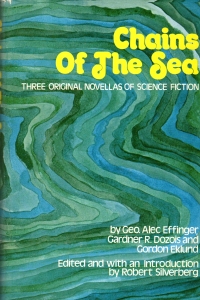 This book almost makes me regret saying:
This book almost makes me regret saying:
It’s an interesting bit, an enjoyable little read from the era–the middle 1960s through, what, the 1980s? where the future is dystopian and overcrowded and the plots are novel and clever.
The book collects three stories, only the third of which I would call novel or clever. The other two are run-of-the-mill apocalyptic bits that put Man in his place.
They include:
- “And Us, Too, I Guess” by Geo. Alec Effinger, which presents a scientist and a working man who wants to breed fish in parallel story lines in the near, dystopian future, when the “scientists” (who work in their own labs on simple experiments that only recreate past discoveries) discover that a single species is dying every day (and might have been for a long time). Hey, here’s the shocking ending: MANKIND DIES. Because of nature or maybe what mankind did to it.
- “Chains of the Sea” by Gardner R. Dozois, in which aliens invade, but nobody can see them. A child, however, who has maintained his imagination even beyond his very early years in the dystopian near future can see the “Others” which are intelligent species that adults cannot perceive. Through them, he learns that the aliens have come to renegotiate compacts with the other species and with the new species, the artificial intelligence in human networks. In a moment of poignant coming-of-age drama for the lad, MANKIND DIES. Also, I’m not sure what the title means or how it applies to the story.
- “The Shrine of Sebastian” by Gordon Eklund tells the story of a reluctant “pope” of a decadant church is tasked by the previous, newly deceased “pope” with burying her remains at the shrine of Sebastian, a future profit who convinces mankind that it should leave the wasteland of the Earth behind. Most men do, but some remained with the robots in a decaying society. Then, MANKIND DIED. Sorry, I was going on habit there. In this case, the things that thought they were human discovered they were Androids, like Sebastian. Mankind might have survived, somewhere out beyond the sky, but here on Earth, ROBOT AND ANDROIDKIND WILL DIE.
In an essay in the Atlantic, Noah Berlatsky ponders
When Science Fiction Stopped Caring About the Future
Most people think of science-fiction as being about the future; it’s a genre that explores possibilities, from Dr. Frankenstein’s invention of artificial life to Ursula K. Le Guin’s world populated by humans who have all evolved into single-gendered hermaphrodites. What might happen if? What could happen when? Sci-fi thinks about new technologies, new societies, and new ways of being, good or bad.
And then science-fiction fans turn to the new Star Wars trailer, and find, not the future, but a reshuffling of 30-year-old detritus.
Read enough of the C-List science fiction from the past, and you’ll learn that the best of science fiction sticks with you but most of it, especially the pedestrian stuff, falls away from you mostly unremembered. A lot of the old stuff retreads common tropes just as much as new stuff does; we just forget it if we even bother to read or to have read it.
So I won’t remember these stories much, but innovative and imaginative stuff from the era will still captivate me. And in time, I’ll recycle my line about how all the science fiction from the past is better than all the science fiction now. Because I’ll mostly remember the good and won’t remember this particular volume much at all.
Books mentioned in this review:


